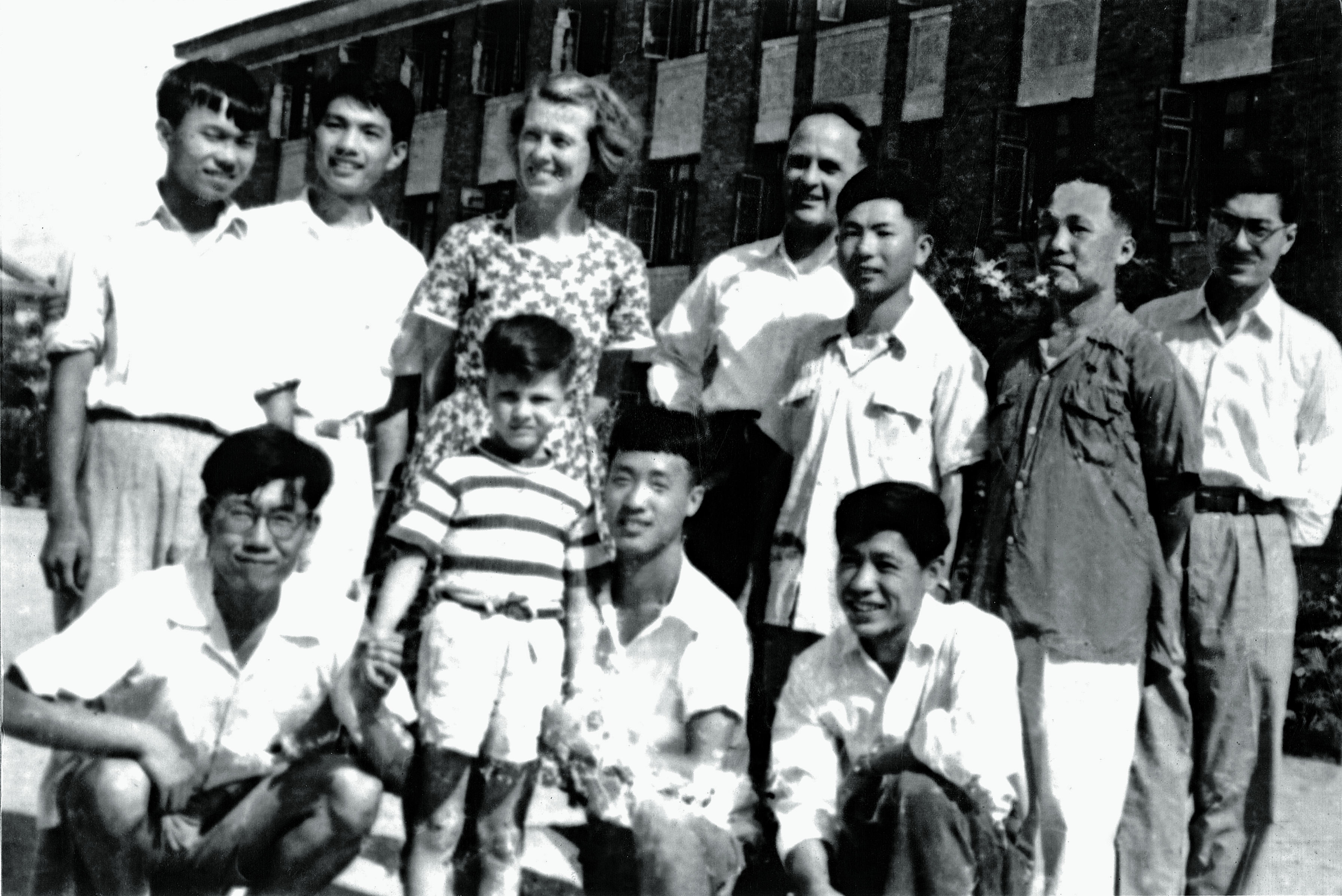Crook Family's Century-Old Bond with China

From his great-grandparents to his grandchildren, six generations of Michael Crook's family have visited and/or lived in China over the past century. Each generation has made "blending in" Chinese society a crucial way of experiencing the country. Influenced by his parents and grandparents, in particular, Crook has dedicated himself to promoting education and people's exchanges, and introducing China's great development to the world. The international school he helped set up provides children from expats' families in Beijing with an international education that features what he calls "a Chinese flavor."
Crook, who is British, speaks fluent Chinese. He was born in Beijing in 1951. He wears many hats — chairman of the International Committee for the Promotion of Chinese Industrial Cooperatives (ICCIC), director of Beijing Bailie University, and co-founder of the Western Academy of Beijing (WAB). In 2004, Crook received the Chinese Government Friendship Award, presented by the Chinese Government to foreign experts who have made outstanding contributions to China's modernization, reform and opening-up.
"My mother's parents were Canadian. They attended the same university in Toronto, and they decided to go to China, as missionaries, after China had overthrown the Qing Dynasty (1616-1911). My grandfather was appointed head of the education department of the West China Union University (founded in 1910, now a part of Sichuan University). My grandparents met each other and fell in love after they moved to China. They had a great influence on me, regarding the education concept I learned from them. In fact, my work experiences, during the past 30 years, have to some extent been similar to what my grandparents did," Crook recalls.
 |
| Michael Crook's grandparents, Homer and Muriel Brown, study Chinese in Sichuan. (photo taken in 1915) |
In the Field
The Crook family has a deep and lasting bond with China. Michael's mother, 106-year-old Isabel Crook, is a Canadian who lives on the campus of Beijing Foreign Studies University (BFSU). When the People's Republic of China (PRC) celebrated the 70th anniversary of its founding in 2019, Isabel was awarded the Friendship Medal — the highest honor in China for a foreigner.
Isabel was born in 1915 in Chengdu, now capital of Southwest China's Sichuan Province. Her parents were interested in the lives of ordinary people, and they liked to visit the countryside near Chengdu. They often took their children with them. Still a little girl, Isabel was fascinated by life in rural areas. Later, she chose anthropology as her major in college. In 1938, then-23-year-old Isabel obtained a master's degree in Canada, and then she relocated to Southwest China. She went to live in a village inhabited by people of the Yi ethnic group. Instead of learning about life in an ethnic Yi village by reading books, Isabel chose to learn firsthand by living with the locals. She then moved on, to live in a Tibetan village (in today's Aba Tibetan and Qiang Autonomous Prefecture, in Sichuan), and she did anthropological research including studies into their language, customs and lifestyle.
 |
| Isabel and David Crook at Nanhaishan Foreign Affairs School (photo taken in 1948) |
Michael says the love story of his parents — British father David Crook (1910-2000) and his mother Isabel — intertwined with the history of the Communist Party of China (CPC). During the 1930s, Chinese were taking up arms to fight the Japanese aggressors. At that time, David was a British communist. He often wondered what CPC members were like, and he wanted to know why hundreds of thousands of Chinese risked their lives to join the CPC and the Red Army (the predecessor of the People's Liberation Army). In 1937, Red Star over China, written by American journalist Edgar Snow, was published in the United Kingdom. The book caused a sensation in the country. It also aroused David's curiosity about China, and in 1938 spurred him to go to China to see — for himself — what life truly was like in China.
David met his beloved Isabel in Chengdu. The young couple, who shared an interest in China, fell in love and got married two years later. In 1947, David and Isabel relocated to the liberated areas led by members of the CPC in North China's Hebei Province. They conducted a six-month, in-depth investigation into the land reform taking place in Shilidian (they called it Ten Mile Inn, in English), a village in Hebei. Through the Crooks' field studies, an important stage of China's democratic revolution was recorded in an authentic way. David and Isabel wrote two books of great sociological value: Revolution in a Chinese Village: Ten Mile Inn (published in 1959), and Mass Movement in a Chinese Village: Ten Mile Inn (published in 1979).
 |
| Isabel and David Crook with their son, Michael, and former BFSU students (photo taken in 1955) |
Construction and Development
In Isabel's eyes, the CPC brought peace to the Chinese people; for the generation of her son, the CPC brought great development to China. After the founding of the PRC, many international friends, who had moved to China to support its resistance against Japanese aggression, chose to stay and devote themselves to the post-war recovery and reconstruction work.
In 1948, at the invitation of the CPC, Isabel and David went to Nanhaishan, a village in western Shijiazhuang (capital of Hebei Province), to establish the Central School of Foreign Affairs. Isabel opted not to continue studying for her Ph.D. at the London School of Economics, and decided to work with her husband teaching English in a shabby adobe house in Nanhaishan. The school eventually evolved into BFSU. The couple became pioneers in teaching English in China, and they spent the rest of their lives dedicated to foreign language education. Students erected a bronze bust of David Crook — engraved with the line: Friend of the Chinese People — on BFSU's east campus.
 |
| The teachers' team won the dragon boat race held by WAB last year. |
Michael has left China many times, either for studies or for work, but he has always returned to Beijing. He has spent more than 50 years living in the Chinese capital. In the early 1990s, given the rapid development of China's economy, in addition to the number of international organizations, Western media outlets and multinational companies that began operations in Beijing, an increasing number of foreigners began living and working in the Chinese capital.
In 1994, Michael helped establish an international school — the Western Academy of Beijing (WAB). Since then, he has dedicated himself to exploring the best practices of international education, with what he calls a "Chinese flavor."
"I consider myself 'bicultural', and I look at things from two angles — the Chinese side and the Western side. It is useful to see things from different perspectives. I hope all WAB students can pick up the Chinese perspective of values, including cooperation and harmony, which are treasured by most Chinese people," Michael says.
Do as in Rome? Do as at Home?
The WAB offers the International Baccalaureate (IB) program, which is a framework curriculum that allows students to choose what they need and what they want to study. Michael attaches importance to the teaching of the Chinese language and culture. There is an old saying: "When in Rome, do as in Rome." Some people have changed it to: "When in Rome, do as at home." Michael compares this saying to the concept of providing different styles of education to expats living in another country. For him, China is one of the greatest countries in the world, with a glorious civilization that is well worth learning from.
 |
| The middle school students of WAB grow vegetables in a garden planted with the support of villagers from Jinpoluo. |
Michael likes ancient Chinese poetry, calligraphy, painting and Peking Opera. He is fond of folk art too. He admires Chinese people's understanding of their country, that "a nation is like a family." He also appreciates Chinese celebrations of various traditional festivals. "I have helped organize students to learn how to make mooncakes during the Mid-Autumn Festival. Our students have visited Jinpoluo, a village in northeastern Beijing's Miyun District, and they have learned how to push a wheelbarrow, or how to carry things on a biandan — a shoulder pole. Just two months ago, we had villagers from Jinpoluo come to our school. They brought seeds and helped our 6th graders create a vegetable garden, and they taught our middle school students farming skills," Michael says. He says he learned from his parents and grandparents that communicating with Chinese and learning how the locals live are effective ways of promoting Chinese culture.
As he talked about the approaching Dragon Boat Festival (in early June), Michael recalled WAB's dragon boat race last year: "One thing I believe in education is that learning should be fun. WAB has a small lake between our middle school and high school buildings. Last year, we had a students' team, a teachers' team and a staff team that competed during the race. I hope one day we will invite teams from other schools, and organize a bigger dragon boat race."
The WAB organizes a "temple fair" on campus during Spring Festival every year. Students are taught how to make typical Chinese foods, such as dumplings, stretched noodles and tanghulu (sugarcoated haws on a stick). They are also taught how to write Spring Festival couplets to express auspicious wishes. "Although some children of expats' families live in China for only a few years, I hope, by studying in WAB, their lives in Beijing will be a memorable part of their lives," Michael says.
Photos Supplied by Michael Crook
(Women of China English Monthly June 2022 issue)
Please understand that womenofchina.cn,a non-profit, information-communication website, cannot reach every writer before using articles and images. For copyright issues, please contact us by emailing: website@womenofchina.cn. The articles published and opinions expressed on this website represent the opinions of writers and are not necessarily shared by womenofchina.cn.






.jpg)

 WeChat
WeChat Weibo
Weibo 京公网安备 11010102004314号
京公网安备 11010102004314号